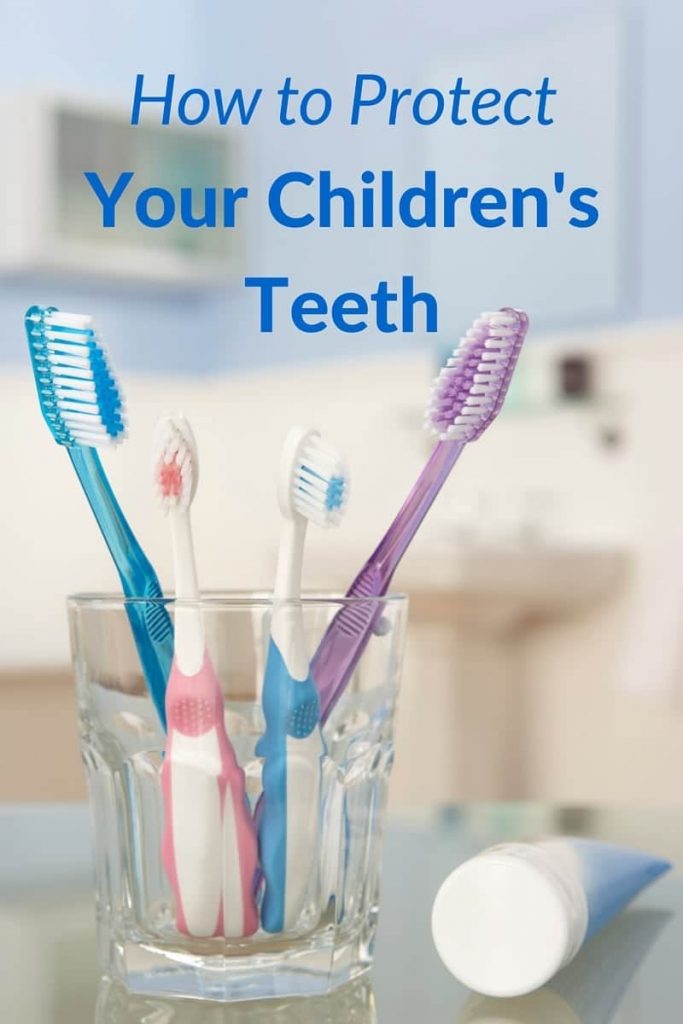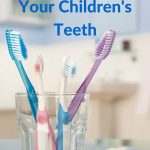This post was sponsored by the MetLife TRICARE Dental Program as part of an Ambassador Program for Influence Central.
February is Children’s Dental Health Awareness Month so today I am sharing information and tips on how to protect your children’s teeth. There are many things you can do even when your children are infants to set them up for good dental hygiene for life. Don’t worry, if you didn’t start at birth, there are still many other ways to protect your children’s teeth no matter how old they are.

For Babies and Toddlers
Before your child has teeth, you can help him or her prepare for good dental hygiene habits later by running a clean, damp washcloth over the gums. This also removes harmful bacteria from baby’s mouth.
Once baby’s teeth start to erupt, switch to an infant toothbrush and use VERY LITTLE toothpaste (about the size of a grain of rice) so baby doesn’t swallow it.
Six months after the first tooth erupts, you should take your child in for his first visit to the dentist. If you’re uncomfortable taking a child so young to the dentist (I didn’t bring any of my children that early), conventional wisdom says that it’s appropriate to wait until age 2 which is when the standard every-six-month visits should begin.
By age 2, children can be taught to spit so you can increase the amount of toothpaste a little to help them practice this skill. This is also a good time to start flossing for them.
For Preschoolers
A pea-sized amount of toothpaste is perfect for this age. Use fluoride toothpaste to protect their teeth. And until they are old enough to avoid swallowing toothpaste, you should supervise their brushing.
Teach your child proper brushing technique.
- Show them how to angle the toothbrush along the gumline and make sure they don’t scrub too hard and irritate the gums
- Show them how to use the tip of the brush to clean behind the top and bottom front teeth
- Show them how to brush their tongue (usually their favorite part!)
This is the perfect age to establish flossing and twice a day brushing habits. Here are some tips to help:
- Use a timer to make sure your child brushes for 2 minutes (ideally one made for kids so that it entertains them while it counts down–there are several timer apps that do this if you don’t want to purchase one to keep on the bathroom sink)
- Buy fun toothbrushes and flossers so kids look forward to taking care of their teeth
- Choose a toothpaste flavor your child likes (but remember to supervise so it is isn’t swallowed)
- Use a brushing/flossing chart and stickers to help kids remember to brush and floss and to positively reinforce the behavior
For School-Aged Children
By now you don’t need to supervise your child’s tooth brushing. Ideally, those habits you helped them develop as preschoolers will continue. However, if they’re anything like my kids, you will need to do spot checks to make sure they haven’t gotten lazy or forgetful when it comes to brushing twice a day for 2 minutes and flossing once a day.
You will also want to consider sealants to prevent cavities. Because my family’s teeth are cavity-prone (poor kids got my teeth), I had sealants applied to all 4 of my kids. It’s completely painless and only takes a few minutes. The dentist basically paints on a protective layer to the surfaces of the molars where food often gets lodged and becomes a breeding ground for bacteria, particularly if those teeth have large pits or grooves (like ours). The sealant protects the teeth from that bacteria and prevents food from getting stuck there. Regular brushing and flossing are still necessary, but sealants are an added layer of protection.
Teeth Grinding
One problem to watch out for at all ages is teeth grinding. Since teeth grinding typically occurs during sleep, you might not notice it unless you hear it. My middle two were night grinders and I could hear them from my bedroom (it sounds like rocks being scraped against one another).
It turns out, teeth grinding is fairly common among toddlers and most outgrow it. There are lots of possible causes (e.g. improperly aligned teeth, pain from an ear infection or teething, allergies), but a common cause (and the culprit in my family) is stress.
As I mentioned, most children outgrow teeth grinding and often, the only negative effect is the noise other family members have to endure. However, it can sometimes result in jaw pain, headaches, and damage to teeth. If you notice any of these effects, you should consult your dentist to see if temporary crowns or night guards are needed.
There are some things you can do to try to prevent teeth grinding:
- Decrease your child’s stress, especially just before bed.
- Try massage and stretching exercises to relax the muscles.
- Make sure your child’s diet includes plenty of water. Dehydration may be linked to teeth grinding.
For Military Families
If you’re a military family member, you probably laughed out loud when you read the first tip above for preventing teeth grinding. Military family life is rife with stress from deployments, frequent moves, and distance from extended family members. Thankfully, one relief from stress we do have is great dental insurance through the MetLife TRICARE dental program.
In addition to the typical coverage for two exams and cleanings per year plus fluoride applications, MetLife TRICARE also covers 80% of the cost of sealants (for children up to age 18) and orthodontic coverage for our kids (up to age 21 OR 23 if the child is a full-time student). And added bonus for those of us with kids in sports – MetLife TRICARE will cover half the cost of an athletic mouth guard once per year.
If you haven’t taken advantage of the affordable dental coverage available to military families, it’s easy to enroll. Choose from any of these methods:
- Online visit www.tricare.mil/bwe
- Call 1-855-638-8371 CONUS, 1-855-638-8372 OCONUS, or 1-855-638-8373 TDD/TTY
- Fax a completed Enrollment Authorization document (found onwww.tricare.mil/tdp) to 1-855-763-1337
- Mail a completed Enrollment Authorization document to MetLife TRICARE Dental Program, P.O. Box 14185 Lexington, KY 40512
For additional program information, visit www.metlife.com/tricare or call the toll-free customer service number at 1-855-638-8371. You can also follow the MetLife TRICARE Dental Program on Facebook and Twitter.


Great tips. We need to teach our children to take care of their teeth so that they’ll last for a lifetime.